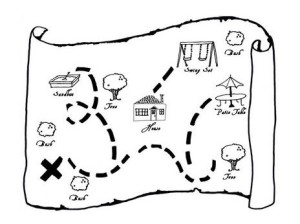Blerched
 Saturday afternoon, I noticed my friend Jaymee had posted on Instagram a photo and results from her 5K run at the Beat the Blerch. What struck me most was that her finish time was an eye-popping 14:35.
Saturday afternoon, I noticed my friend Jaymee had posted on Instagram a photo and results from her 5K run at the Beat the Blerch. What struck me most was that her finish time was an eye-popping 14:35.
Now Jaymee is a fantastic athlete and wonderful person, but I’d bet the house that she didn’t run 14:35 for the 5K.
Why am I so sure? Well, probably because the women’s American Record for the 5K is 14:45 and held by Molly Huddle.
I laughed and joked with her a bit but then started hearing murmuring about all the distances being short. A couple of people reported the marathon to be a mile or more short, and the half marathon clocking in at less than 13 miles.
There were also reports of poor course marking and a lack of lead bicycles.
Folks who were running just for grins (like Jaymee) weren’t overly upset by any of this, but others, particularly the marathoners, seemed a bit more bummed.
The event’s Facebook page has a long stream of comments on this topic. Complaints from runners and defenders of the event and the cartoonist.
There is also a Reddit thread on the event, with complaints from runners about organization, course accuracy, and an apparent lack of Blerches, whatever that is. (Note: I have to admit, I am only glancingly familiar with the comic on which the Blerch event is marketed around.)
This prompted me to look over the event website to check what was promised. It turns out to be not much (PDF).
Now as someone who’s worked in various aspects of race management, I’m sensitive to folks looking at their GPS watch or phone and complaining about the course being wrong.
Generally, if you are running on an accurate road course, your GPS watch will measure it long. Here is USATF’s official statement on GPS watches:
GPS devices work by receiving signals from satellites. The quality of different GPS units can vary, but all of them can be affected by conditions such as buildings in urban environments or heavy overhead tree cover that interfere with reception of the satellite signals and can cause them to be inaccurate.
Race courses Certified by USATF are measured by a proven method that incorporates the calibration of measuring devices against a steel tape and are verified by multiple measurements.
Race courses are measured along a well-defined path called the “SPR”—the Shortest Possible Route that a runner can possibly run. Most runners don’t actually run the SPR, so the distance recorded by their GPS device will usually be longer than the certified length of the course, even though the course was properly measured along the SPR according to USATF rules.
But based on what I’m hearing, and what I read about the course on the website, it was probably short. I’ll leave it to your conscience as to whether you claim that PR.
Now what? So you ran a race and think the course was short. What can you do? In most cases, not much. The past is gone. It went like dust to dawn. (Sorry about that.)
I think the phrase to remember next time is caveat emptor: Let the buyer beware.
Unless you are awash in time and money, before you plunk down some hard earned coin on any event, you need to know what you are getting into.
 While I am generally skeptical of any multi-city, “themed” event (mud, colors, zombies, foam, etc.), if you are doing it strictly for fun, then anything goes. Although you might still want to check to see if your race organizer has ever killed anyone.
While I am generally skeptical of any multi-city, “themed” event (mud, colors, zombies, foam, etc.), if you are doing it strictly for fun, then anything goes. Although you might still want to check to see if your race organizer has ever killed anyone.
If you’ve been training with purpose for a specific distance or result, then pick an event and an organization with a history of good management. (Be careful here, as some companies will provide timing at an event (e.g., Change of Pace or Capital Road Race Management) but not have any control over any other event details.)
You can also check to see if the course is certified. Certification is not an iron clad guarantee of accuracy, but it shows the course designer at least made a good faith attempt to measure correctly. You can search for USATF certified courses here.
Race organizers should be clear about what they are providing at their event, and you should feel free to contact them if you have a question. They are usually good about responding. If they don’t respond, then feel free to give your money to some other event.
And finally, ask your friends or coach, and maybe do a little Yelping. Hopefully this will get you to an event that meets your expectations.
Road Runners Club of America also has some good Buyer Beware tips.
You’ve done your training and preparation to get to the starting line. It’s reasonable to expect that race organizers do their homework, too.
Happy running!
Note: I did reach out to the Beat the Blerch event and have not received a reply.
